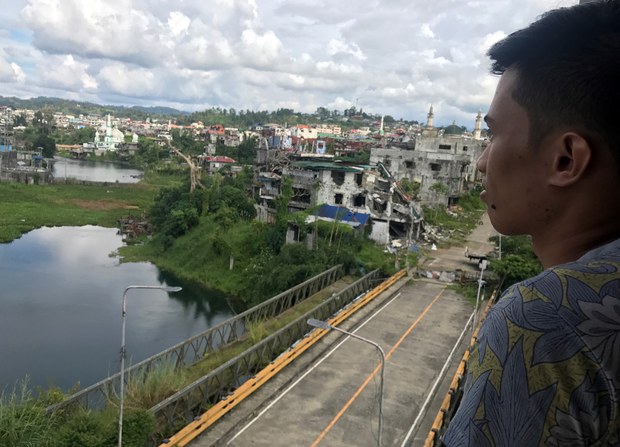Martial Law in Southern Philippines Could Be Extended, Spokesman Says
2018.10.18
Marawi, Philippines
 A boy views the destroyed commercial district of the southern Philippine city of Marawi from atop a building, Oct. 18, 2018.
A boy views the destroyed commercial district of the southern Philippine city of Marawi from atop a building, Oct. 18, 2018.
Updated at 1:55 p.m. ET on 2018-10-18
President Rodrigo Duterte may extend martial law in the southern Philippines beyond this year, his spokesman said Thursday, noting that tight military rule in the volatile south has effectively kept Islamic State-linked militants at bay.
Congress had earlier approved a one-year extension of the martial law covering the entire southern island of Mindanao until December this year, giving the military enough time to round up militants who had escaped from Marawi last year.
The gunmen, led by Isnilon Hapilon, the acknowledged IS chief in the Philippines, included fighters from Southeast Asia and the Middle East, who sacked Marawi for five months, leading to vicious gun battles that destroyed the lakeshore city, displaced 200,000 of its residents and killed 1,200 people, mostly militants.
“Well, according to the military, the martial law has helped in the peace and order situation. And it has dissuaded the terrorists from inflicting the usual violence against the population,” presidential spokesman Salvador Panelo told reporters.
There might be a “need to extend military rule,” he said. “But according to the president, it will depend on the advice, the recommendation of the military because they are the ones on the ground.”
Earlier this year, the government had warned that dozens of followers of the slain Hapilon remained at large in Mindanao and were trying to recruit Muslim youths in remote areas.
The military also said that at least 48 foreign militants were known to have landed on Mindanao island and were in charge of recruitment.
Congress extended martial law until end of this year
Duterte placed Mindanao under martial law on May 23, 2017, after the IS-inspired militants laid siege to the predominantly Islamic city. Military rule was set to expire in December 2017, but Congress had agreed to extend it until the end of this year.
Rights groups have been calling on the president to lift the martial law, accusing the military of carrying out atrocities. Officials had denied the allegations.
Col. Romeo Brawner, the military’s deputy commander in Marawi, said martial law had helped maintain security.
“But we are not resting. We are making sure the city is indeed safe because of martial law implementation,” Brawner said.
He said that he favored that the military retained control in Marawi, where the rebuilding efforts had been slowed down by construction delays.
Brawner said the prevailing situation was entirely different to the previous martial law, noting that soldiers now were more professional than in the past.
He was alluding to martial law imposed by the late dictator Ferdinand Marcos in 1972 until 1981, during which he jailed opposition leaders, imposed curfews and padlocked media outlets.
Thousands of activists went missing or killed, while state coffers were raided. Anti-graft investigators said Marcos and his cronies stole up to $10 billion during his two decades in power until he was toppled by a popular revolt in 1986, sending him into exile in Hawaii, where he died of natural causes three years later.
Militant attacks, according to authorities, have continued in parts of Mindanao despite tight military rule that included security road blocks. Just this month, six anti-narcotic policemen were slain by gunmen in an ambush near Marawi.
In August, Filipino militants set off homemade bombs that killed at least two peoples and injured dozens of others in Isulan town, also in Mindanao.
On July 31, a suicide bomber set off a van loaded with explosives, killing at least 10 people on Basilan island.
In both incidents, the IS had claimed responsibility even as Filipino military officials had blamed local militants.
Froilan Gallardo in Marawi contributed to this report.
CORRECTION: An earlier version wrongly reported that the presidential spokesman came out with comments about martial law on Wednesday.







